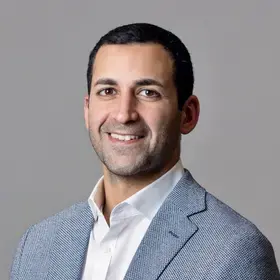Michael J. Menconi, Jr., ‘20SPS, Bioethics, is on a mission to shift the delivery of healthcare in the U.S. to a “human-centered” approach. But to do it, he knew he’d need an educational background in law, bioethics and public health. The 2020 graduate of Columbia University’s dual-degree Master of Science in Bioethics/ Master of Public Health program is now pursuing a J.D. at New York Law School. He hopes to pioneer a new era of ethically-guided laws and policies that serve both patients and medical institutions grappling with complex dilemmas brought on by new, sometimes controversial advances in medicine and biotechnology as well as longstanding epidemiological patterns.
What led you to pursue a dual M.S./M.P.H. in bioethics and public health? Why did you choose to study at Columbia?
Bioethics and public health are inextricably linked. My work on hospital ethics committees and clinical ethics consultation services has frequently involved patients of low socioeconomic status with multiple comorbidities. Bioethics addresses the social, legal and ethical implications of medicine and emerging biotechnologies, while public health examines the social determinants of health—i.e. why are certain demographics plagued by higher rates of obesity, hypertension, cardiovascular disease and cancer? What are the structural, economic, social and cultural explanations of these phenomena? Why does one’s zip code in many cases dictate health outcomes? Public health is therefore a natural extension of the study of bioethics.
Columbia — in addition to being one for the first internationally-renowned universities to offer a dual-degree program of this kind — is a truly remarkable place to study the intersection of bioethics and public health. The Bioethics M.S. program draws on all of Columbia’s top-ranked graduate schools to formulate a world-class, interdisciplinary bioethics curriculum — and all of the faculty are leaders in their field. The Mailman public health program, with an equally impressive faculty, allowed me to view and advance my bioethics training through a biopsychosocial lens.
How did your Columbia experience strengthen your candidacy for law school? How does it give you an advantage in law school now?
My bioethics training at Columbia was undoubtedly intellectually rigorous — it challenged me to think critically, analyze facts, synthesize data and formulate conclusions grounded in sound, logical reasoning. The same skills are highly sought after in the legal profession. In health law — where I intend to ultimately practice — my Columbia training will prove especially valuable. My coursework has provided me with practical understandings of the patient experience, and illness more generally. Furthermore, my study of the social determinants of health has provided me with a systems-based framework that explains the rampant healthcare disparities plaguing our society. This is crucial knowledge as the law begins to respond to the COVID-19 pandemic.
Columbia — in addition to being one for the first internationally-renowned universities to offer a dual-degree program of this kind — is a truly remarkable place to study the intersection of bioethics and public health. The Bioethics M.S. program draws on all of Columbia’s top-ranked graduate schools to formulate a world-class, interdisciplinary bioethics curriculum — and all of the faculty are leaders in their field."
During my first year of law school, I have already encountered several cases that I previously studied in the Law and Bioethics course taught by David Hoffman — an accomplished healthcare lawyer and hospital administrator. These cases most notably involve the “right to die” and consent, and the resulting judicial opinions have not only influenced society’s understanding of end-of-life issues and personal autonomy but have also permeated and influenced many different areas of law unrelated to healthcare.
Tell us about some of the most valuable parts of your Columbia Bioethics experience.
Dr. Rothchild’s Introduction to Clinical Ethics course provided me with the conceptual foundation to successfully pass the Healthcare Ethics Consultant-Certified (HEC-C) exam offered by the American Society for Bioethics and Humanities (ASBH). This is a professional certification exam for which I sat at the conclusion of my first semester in the bioethics program.
For bioethics students without previous clinical ethics consultation experience, I strongly recommend enrolling in the Clinical Ethics Practicum. It provides an invaluable opportunity to explore and experience the practical side of bioethics. It also will help in acquiring the 300 hours of clinical experience required to sit for the HEC-C exam.
In addition, two core courses in the Bioethics M.S. program (Research Ethics and Introduction to Clinical Ethics) provide students unique opportunities to sit in on hospital ethics committees and institutional review boards (IRBs) at hospitals throughout NYC. I strongly encourage all students to take advantage of this incredibly rare and invaluable opportunity.
My bioethics training at Columbia was undoubtedly intellectually rigorous — it challenged me to think critically, analyze facts, synthesize data and formulate conclusions grounded in sound, logical reasoning... Furthermore, my study of the social determinants of health has provided me with a systems-based framework that explains the rampant healthcare disparities plaguing our society. This is crucial knowledge as the law begins to respond to the COVID-19 pandemic."
You were the Editor-in-Chief of Voices in Bioethics. By your estimation, what's the most pressing or interesting bioethical issue(s) in the U.S. response to COVID-19? How can practitioners of the law play a role in resolving the situation?
Serving as editor-in-chief of Voices in Bioethics as COVID-19 began to take hold was truly a surreal experience. My article, "NY Hospitals Issue Problematic Ban on Birthing Support Persons from Labor & Delivery Units," published in March, was picked up by numerous media outlets. Two days later, Governor Andrew Cuomo issued an executive order lifting the overly restrictive, clinically harmful and ethically questionable policy. A coincidence, perhaps — but nonetheless an important lesson regarding the power of the published voice in instigating policy change.
In working closely with our dedicated editorial staff and our Managing Editor Anne Zimmerman (who has since stepped into the EIC role), we were able to quickly establish a journal section entitled, “COVID-19: Ethical Aspects” and begin publishing interdisciplinary commentary on emerging bioethical issues that arose out of the pandemic. We published, and continue to publish, articles authored by frontline healthcare workers, leading scholars and researchers in the fields of bioethics and public health and many others. Much of the commentary, including my own, focused on significant health disparities that have worsened as a result of the pandemic. Many of the pieces focus on the need to address the social determinants of health and provide recommendations for amending ill-advised policy responses to the pandemic.
Moving forward, I foresee the distribution of the COVID-19 vaccines becoming the preeminent bioethical issue. Ensuring these vaccines are distributed fairly and equitably as well as ensuring they are safe prior to widespread distribution (i.e. preventing FDA protocols from becoming politicized) are among the highest of priorities. I am sure Dr. Klitzman will be addressing these issues thoroughly in his Research Ethics and Global Health courses.
Serving as editor-in-chief of Voices in Bioethics as COVID-19 began to take hold of was truly a surreal experience. My article, 'NY Hospitals Issue Problematic Ban on Birthing Support Persons from Labor & Delivery Units,' published in March, was picked up by numerous media outlets."
What's next for your career? Where do you see the field of bioethics going, and how do you hope to make an impact on it?
Throughout my experience serving on hospital ethics committees, I’ve identified a common need for a medicolegal perspective. I intend to pioneer a novel iteration of therapeutic law — the practice of which will aim to protect patient autonomy, aid healthcare institutions in delivering human-centered care and ultimately implant the theory and practice of bioethics into the ethos of the healthcare delivery enterprise in the United States. I hope to ultimately serve as general counsel for a large hospital system, preferably one that serves diverse patient populations, and simultaneously serve on the hospital’s ethics committee, providing a much-needed voice on the legal aspects of patient care. Often, clinical ethics consultations involve various aspects of family law (guardianship and advance directives), insurance matters and endless regulatory and administrative matters. In addition, tension frequently arises between the hospital’s risk management and compliance responsibilities and the fiduciary obligations that healthcare providers and clinical ethicists owe to the patient. Legal skills like mediation and conflict resolution prove invaluable in addressing conflicts between patients, families and healthcare providers.
The need for lawyers with a bioethical perspective is poised to exponentially increase in the years ahead. Notwithstanding the plethora of bioethical issues arising out of the ongoing global pandemic, the legal and regulatory landscape are rapidly adapting to advances in medicine, biotechnologies and public sentiment. I recall a conversation I had with a doctor in California who told me how unprepared they were when the state passed the Death with Dignity Act, which legalized medical-aid-in-dying (MAID). Shortly after the law’s enactment, patients began requesting MAID and hospitals were lacking institutional policies that effectively translated the statutory law into clinical practice guidelines. Physicians were left confused and many simply refused to offer MAID in the absence of institutional policy guidelines related to MAID. A similar law is likely to pass in New York soon; I hope to be on the front lines as New York hospitals respond to this and other laws that hold serious bioethical implications.


